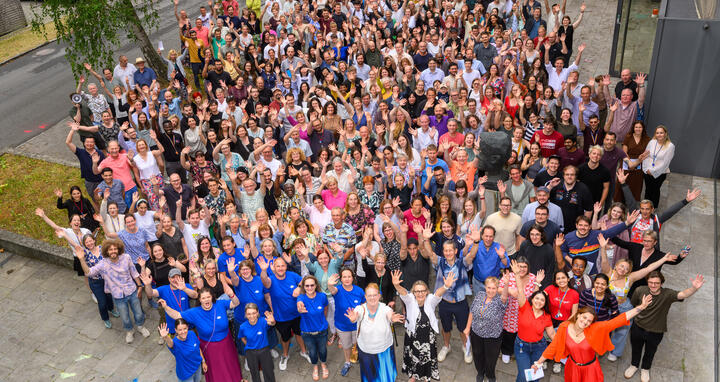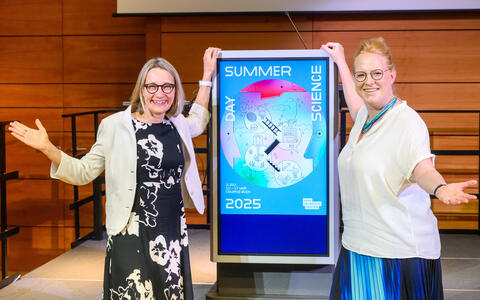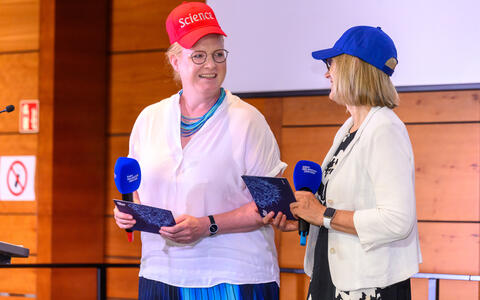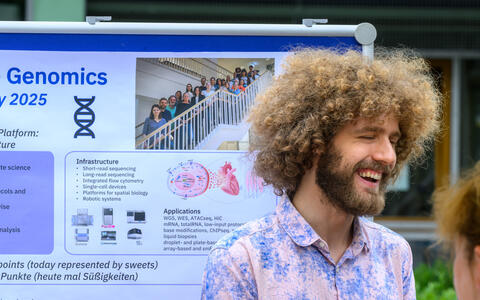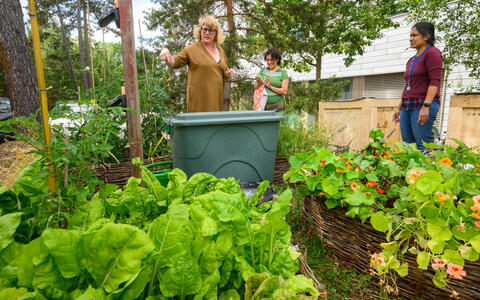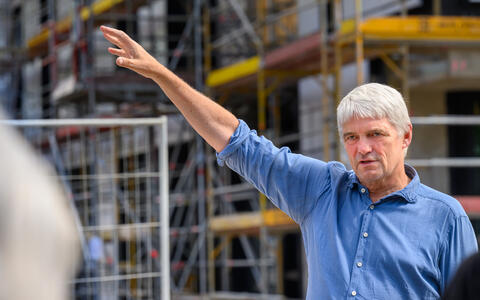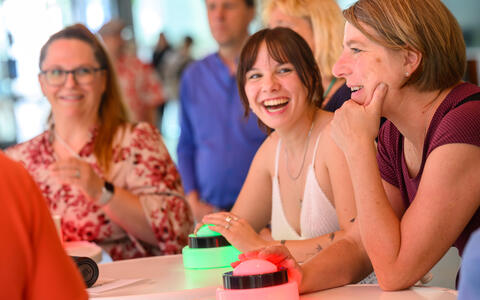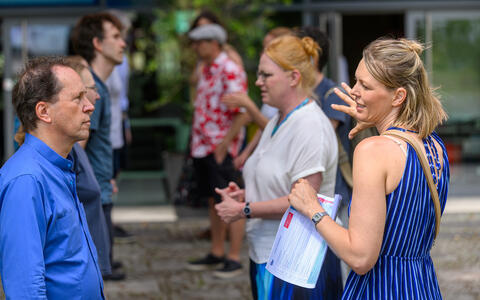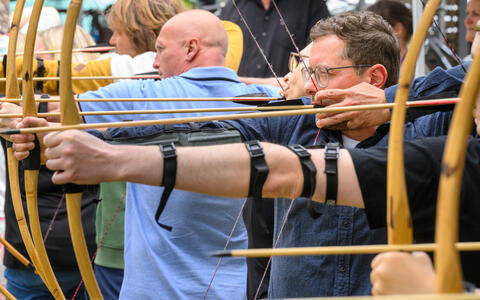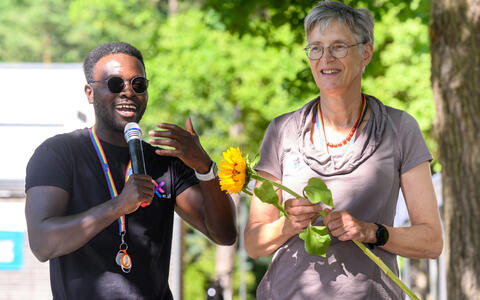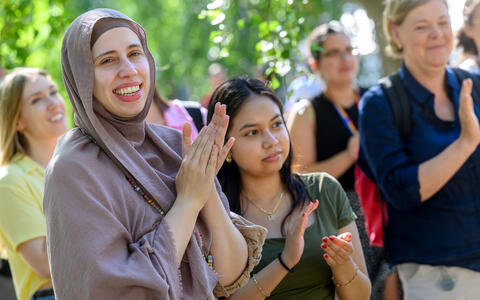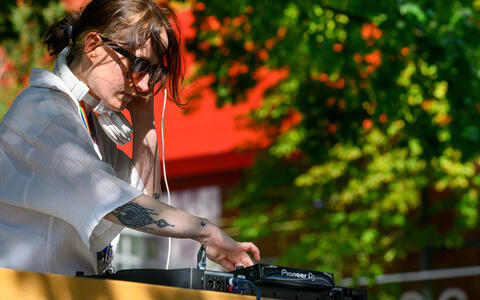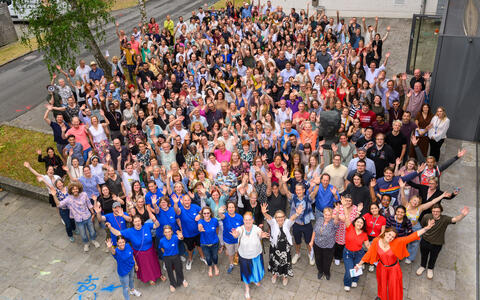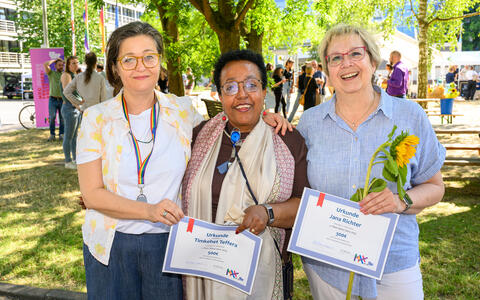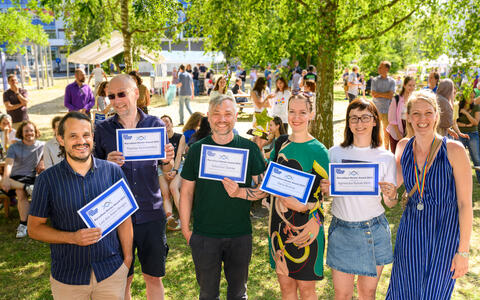Summer Science Day 2025: Uniting under one goal
On July 3, the Max Delbrück Center celebrated Summer Science Day 2025 – transforming the campus into a vibrant hub of scientific exploration and community engagement. This year, in addition to a festive program of food, music and games, the event featured lab tours, presentations, workshops and information booths to foster exchange among our diverse staff. People who work in administration had the opportunity to learn about how research is done at our center, and vice-versa. The program was specifically designed to support goals set out in our new Strategy 2030.
“Summer Science Day is about uniting our institute under a shared vision,” said Professor Maike Sander, Scientific Director of the Max Delbrück Center in her opening talk. “We aim to advance predictive systems medicine and everyone plays a vital role in making that happen.”
“We have already grown together,” added Kirstin Bodensiek, Acting Administrative Director of the Max Delbrück Center. “With this new event format, we are continuing to build bridges to foster greater exchange from the bottom up. That’s not only who we are, but also who we want to be.”
Talks, workshops, games
On a pleasantly warm summer day, the Max Delbrück Center staff could choose from over 50 different activities that included: gathering information at booths about what the different departments do, join games such as Immune Cell Bingo and a Pub Quiz, or simply linger over lunch at picnic tables set out on the large lawn at Campus Buch.
At one workshop, for example, participants used precision lasers, normally used to extract single cells from tissues, to inscribe their names onto individual rice grains. And during a lab tour of the Advanced Light Microscopy Platform, visitors gained insight into imaging technologies that researchers use to visualize cellular structures and processes.
Head of Technical Facility Management Ralph Streckwall gave a tour of our new demonstrator lab, where interdisciplinary research teams will come together to translate our discoveries into innovative therapies – the lab is scheduled to be begin operations in September. And Sustainability Officer Christian Panetzky gave a talk about steps Max Delbrück labs are taking to reduce their environmental impact. And as part additional sustainability efforts, staff were invited to contribute to building a new raised garden bed using repurposed old microscope cases as a frame.
Honoring our own
Capping the event were two different awards honoring employees who have shown outstanding effort this year. This first recognized people who work behind the scenes on various projects, but who remain in the background. These “Silent Heroes” are often the backbone of campus operations and deserve recognition, said Dr. Jean-Yves Tano from Friends of the Max Delbrück Center, which sponsored the award and come with a small cash prize.
Our “Silent Hero” awards: Dr. Timkehet Teffera Mekonnen (center) from our events team is the first-place winner for being the “rock that every team needs.” Jana Richter (right) takes second place for her stewardship of the Junker Lab, and Dr. Michaela Herzig (left) wins 3rd place for her 15 years of service in building the graduate program.
The first place “Silent Hero” award went to Dr. Timkehet Teffera Mekonnen from our events team. “She is the kind of person who shows up every day not to be seen, but to really make a difference. She does it quietly, steadily, with warmth and fun,” said Science Manager Anne Merks, who honored Mekonnen by reading aloud comments from people who supported her nomination. “Timi is that the rock that every team needs, the epitome of above and beyond. Whatever life and circumstance might throw at her, she just takes it and deals with it, calm, collected and with a smile,” wrote another person.
Jana Richter, Technical Assistant in the lab of Professor Philipp Junker, took second place for always being available to her team to get a job done. “She often says that for her little sheep, she will do anything. And everyone who works with her says that this is true,” said Johanna Berenike Kroll, a PhD student in the Junker lab who nominated Richter. Michaela Herzig, who will be leaving the Max Delbrück Center this year, won 3rd place for her 15 years of service in building the graduate program. “She has been very instrumental in many different projects,” said Tano. “We are really happy to have had her here.”
This year also featured a “Marvelous Mentor” award. “This award shines a light on something we all know makes a huge difference in science – but is often not recognized enough: great mentorship,” said Dr. Grietje Krabbe from our Strategy Department. The award recognizes people committed to supporting junior staff by offering genuine care, an inclusive environment and encouraging strategic action, she added. Other criteria include adapting mentoring style to individual needs and leading by example. Of the nine nominees, the jury chose Dr. Daria Bunina, Group Leader of the Systems Biology of Cardiovascular Diseases lab, as winner of the award. Bunina and all nominees received certificates, because all of them are equally great, Krabbe said.
Nominees for the “Marvelous Mentor” award all receive honorary certificates. From left: Dr. Luiz Gustavo dos Anjos Borges,Dr. Thomas Kammertöns, Dr. Sebastian Diecke, Dr. Daria Bunina, Dr. Agnieszka Rybak-Wolf with Dr. Grietje Krabbe from our Strategy Department who handed out the awards. Nominees who could not attend and are not shown: Dr. Anis Senoussi, Dr. Ashley Sanders, Professor Katja Simon and Dr. Nadine Haase.
“The first Summer Science Day at the Max Delbrück Center, far exceeded our expectations,” Bodensiek said. “The program was diverse, inspiring, and rich with creativity. Most of all, the lively exchange of ideas and experiences throughout the day was a powerful reminder of the strength and vibrancy of our community.”
Text: Gunjan Sinha

